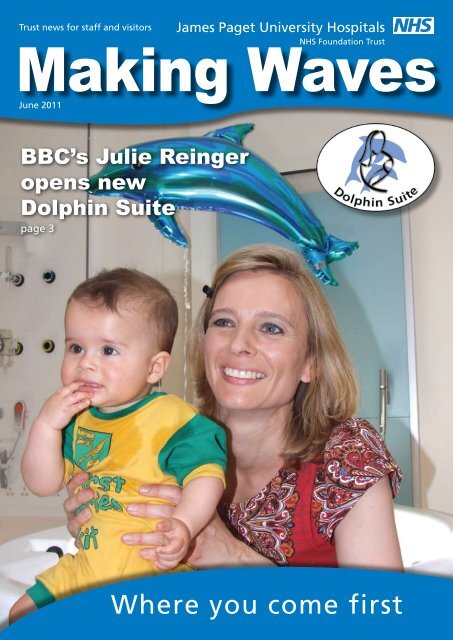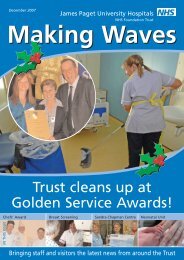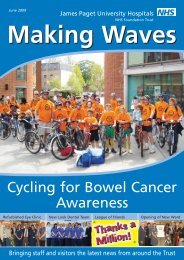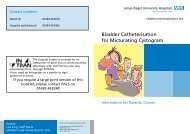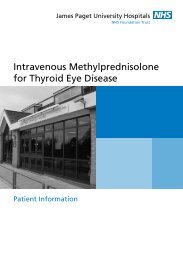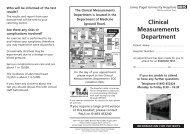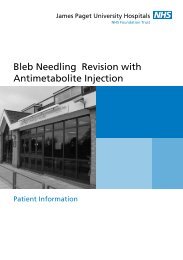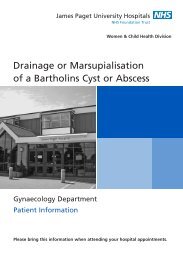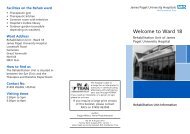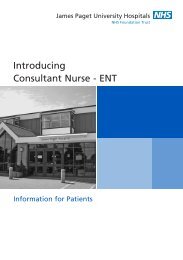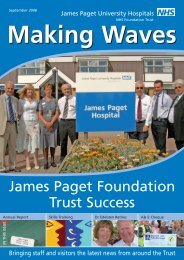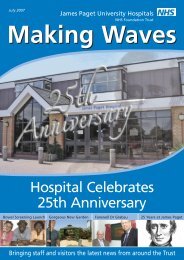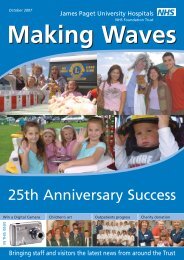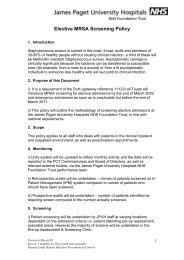Making Waves June 2011 - James Paget University Hospitals
Making Waves June 2011 - James Paget University Hospitals
Making Waves June 2011 - James Paget University Hospitals
You also want an ePaper? Increase the reach of your titles
YUMPU automatically turns print PDFs into web optimized ePapers that Google loves.
Trust news for staff and visitors <strong>James</strong> <strong>Paget</strong> <strong>University</strong> <strong>Hospitals</strong><br />
NHS Foundation Trust<br />
<strong>Making</strong> <strong>Waves</strong><br />
<strong>June</strong> <strong>2011</strong><br />
BBC’s Julie Reinger<br />
opens new<br />
Dolphin Suite<br />
page 3<br />
Where you come first<br />
www.jpaget.nhs.uk <strong>Making</strong> <strong>Waves</strong> Newsletter <strong>June</strong> <strong>2011</strong> Page 1
Editorial<br />
What a wonderful, happy picture<br />
on the front cover, highlighting a<br />
great new service for local mums<br />
to be. Julie was a passionate<br />
spokesperson, as a recent ‘new<br />
mum’, and was really impressed<br />
with our facilities as she officially<br />
opened the new midwifery led<br />
birthing unit, the Dolphin Suite.<br />
Many photos were taken, but when<br />
her son Finn was changed into his<br />
NCFC strip, on the very day that the<br />
team were celebrating promotion<br />
in Norwich, the photographs were<br />
just too good an opportunity to<br />
miss. Sorry, for all those who don’t<br />
support the yellow and green! My<br />
thanks go to Julie for giving up<br />
nearly three hours of her day to<br />
join us – we really appreciated it.<br />
This issue introduces you<br />
to the education and practice<br />
development team on page 10,<br />
so you can match names to faces,<br />
and have some understanding of<br />
their role in implementing best<br />
practice and supporting our staff<br />
to provide excellent care. The<br />
work of the Trust’s school nurses<br />
is also highlighted on page 12,<br />
and the IT service desk’s success in<br />
achieving Connecting for Health<br />
accreditation on page 15 . If you or<br />
your team would like to feature in<br />
a future issue, do please talk to Jon<br />
Dack.<br />
Finally, Guy Vautier has sent us<br />
an update on his first few months<br />
in New Zealand – sounds like it was<br />
a worthwhile move, so I hope you<br />
will all enjoy reading all about how<br />
he’s getting on.<br />
Ann Filby<br />
Head of Communications,<br />
Engagement and Foundation<br />
Page 2 <strong>Making</strong> <strong>Waves</strong> Newsletter <strong>June</strong> <strong>2011</strong><br />
Welcome<br />
This edition of <strong>Making</strong> <strong>Waves</strong> is a celebration of achievements.<br />
Many of them relate to initiatives and projects inside the<br />
hospital and some reflect the contributions staff make to<br />
healthcare outside the Trust and in some cases outside the UK.<br />
The opening of the Dolphin Suite is great news and it<br />
is pleasing that the hospital is leading the way in Norfolk<br />
in providing this kind of facility to expectant mothers.<br />
Congratulations to everyone involved in bringing the new unit<br />
Wendy Slaney<br />
to fruition.<br />
From leading the way in care for dementia patients and the excellent<br />
‘More About Me’ project to helping develop an awareness campaign to<br />
reduce the risk of jiggers in Kenya, there are highlights of the wide range of<br />
activities that our staff are involved in.<br />
The process of embedding our values into our everyday working lives<br />
continues, further details are featured in this issue. Our Transformation<br />
programme and the six workstreams continue to work towards cost savings<br />
whilst maintaining the delivery of high standards of care.<br />
Finally, congratulations to the 57 ladies who trekked up Ben Nevis to<br />
raise thousands of pounds for the Palliative Care East resource centre. Their<br />
commitment to the cause and their teamwork is inspirational and they fully<br />
deserve the plaudits they’ve received. Bravo!<br />
Essential Care<br />
In recent weeks, the Trust has extended its opening hours to make visitors<br />
feel welcome and give everyone the opportunity to support their relatives or<br />
friends during their stay in hospital.<br />
Extending our visiting times will offer more flexibility to both our patients<br />
and their visitors.<br />
This change is part of our on-going focus on patient centred care. We are<br />
currently training staff in preparation for the introduction of ward assistants.<br />
This role focuses primarily on providing additional support to patients at<br />
mealtimes. They will be instantly recognisable by their lilac striped tabards.<br />
We have recognised that we have increasing numbers of patients<br />
who require encouragement and assistance at mealtimes to ensure their<br />
nutritional needs are met whilst in hospital. We need to be confident that<br />
patients are eating the good quality food we provide.<br />
In addition, we are continuing to recruit additional Mealtime Service<br />
Providers. These are volunteers who give up their time to ensure vulnerable<br />
patients get the help and encouragement they need at mealtimes. Anyone<br />
interested in becoming a volunteer should contact Tracey Beevor on<br />
01493 453240.<br />
www.jpaget.nhs.uk
Latest News<br />
Before During After<br />
Dolphin Suite makes a splash at JPUH<br />
BBC weather presenter and new mum, Julie Reinger, officially opened the Dolphin Suite on May 10.<br />
The state of the art midwifery led birthing unit, the first in Norfolk, enables local mothers to have midwife led care in a<br />
relaxed environment, for a normal labour and birth.<br />
The unit has a reception area, three ensuite birthing rooms, two of which have facilities for water birth plus a small<br />
kitchen area with facilities for people to have food and drink. There is also discreet access to emergency equipment for<br />
adult and neonatal resuscitation if required.<br />
Senior midwife co-ordinator Helen Smith said:<br />
“This unit allows midwives to do what they do best.<br />
We are experts in normal childbirths and are the right people to<br />
look after normal births.”<br />
The unit has no cots for newborns, which is a deliberate move as Helen explains:<br />
“We believe very strongly that babies should have the skin to skin contact, helping to promote<br />
breast feeding, to regulate temperature and giving a really good start to being a mother.”<br />
As Julie formally opened the unit by cutting a ribbon, she said:<br />
“I’m sure the home from home environment of this new unit will make more women feel as if they are coming<br />
somewhere special to have their child, rather than them feeling they’re off to hospital, which can make a lot of people<br />
quite nervous and stressed…two emotions you really want to try and avoid during labour.<br />
“As a relatively new mum, I now fully understand just how vital it is that a birthing mother feels as relaxed and<br />
comfortable as possible and also safe so she can concentrate on bringing her baby into the world. I think its so important to<br />
get the message out there that with a calm and supportive atmosphere and a calm and supportive midwife, most women<br />
can give birth naturally and I hope the unit will not only deliver plenty of babies but lots of positive birth stories and<br />
experiences too.”<br />
The new Dolphin Suite sign (pictured) was very kindly funded by the hospital League of Friends.<br />
www.jpaget.nhs.uk <strong>Making</strong> <strong>Waves</strong> Newsletter <strong>June</strong> <strong>2011</strong> Page 3
Patient Safety Project<br />
Insulin Safety in the Acute Care<br />
Setting – A High Risk Medication<br />
Diabetes is a common condition which can affect anyone and is on the increase. In 2010 it was estimated that there are<br />
3,099, 853 people 16 years old and over with diagnosed and undiagnosed diabetes which equates to 7.4% of the population<br />
in that age range. This is estimated to increase to 8.5% by 2020. Approximately 10 – 15% of the population have Type 1<br />
diabetes whilst 85 – 90% have Type 2 diabetes.<br />
In Type 1 diabetes the<br />
body makes very little or no<br />
insulin at all and develops<br />
quickly, the treatment for<br />
this type of diabetes is<br />
insulin. By comparison in<br />
Type 2 diabetes the body<br />
either does not make<br />
enough for the body’s<br />
needs or it can’t use the<br />
insulin properly (insulin<br />
resistance). Type 2 diabetes<br />
can be treated with diet and<br />
lifestyle changes to help the<br />
body use the insulin more<br />
effectively, tablets, insulin<br />
or a combination of these<br />
treatments. People with Type<br />
2 diabetes can often control<br />
their diabetes well on tablets<br />
for 6 – 8 years, but the<br />
body’s ability to make and<br />
use insulin steadily declines<br />
over the years resulting in<br />
the need for insulin or a<br />
combination of insulin and<br />
tablets.<br />
Insulin is a hormone<br />
made by the body that<br />
controls a person’s sugar<br />
levels by helping sugar move<br />
from the bloodstream into<br />
cells for the body to use as<br />
energy. Without enough<br />
insulin the sugar levels rise<br />
in the blood stream which<br />
will result in symptoms<br />
of diabetes and over<br />
time will lead to diabetes<br />
complications developing.<br />
Insulin is a potent,<br />
lifesaving medication<br />
which, when prescribed and<br />
administered appropriately<br />
and accurately, can be<br />
effective in keeping<br />
steady blood sugar levels.<br />
However, inappropriate or<br />
Page 4 <strong>Making</strong> <strong>Waves</strong> Newsletter <strong>June</strong> <strong>2011</strong><br />
inaccurate prescribing can<br />
lead to low blood sugar<br />
levels (hypoglycaemia) or<br />
high blood sugar levels<br />
(hyperglycaemia) which<br />
can increase length of stay<br />
and can lead to patients<br />
having a poor experience.<br />
Insulin is frequently listed<br />
as one of the top five “high<br />
risk medications” in the<br />
inpatient setting. A National<br />
Patient Safety Agency Rapid<br />
response report (NPSA/2010/<br />
RR03) 2010, and the NHS<br />
diabetes document Safe<br />
and Effective Use of insulin<br />
in hospitalised patients<br />
(2010) identified practices<br />
with insulin administration<br />
and prescription which are<br />
known to lead to error or<br />
harm.<br />
The 2010 National<br />
Diabetes Inpatient audit<br />
(November 2010) identified<br />
that 6.2% of adult inpatients<br />
in the JPUH have diabetes, of<br />
which 48.3% were on insulin.<br />
The audit results show us<br />
how diabetes care provided<br />
in our Trust compares to that<br />
in other Trusts and helps us<br />
to identify areas where we<br />
could improve the safety<br />
and quality of our patients’<br />
experience. We intend to<br />
take part in this national<br />
audit again in <strong>2011</strong>. This<br />
will show what effect our<br />
changes have had.<br />
The <strong>James</strong> <strong>Paget</strong><br />
<strong>University</strong> Hospital diabetes<br />
team are working towards<br />
improving patient safety by<br />
reducing the known risks<br />
associated with diabetes<br />
management.<br />
<strong>James</strong> <strong>Paget</strong> <strong>University</strong> <strong>Hospitals</strong><br />
NHS Foundation Trust<br />
In Autumn of 2010 we<br />
•<br />
•<br />
•<br />
Introduced a Safe Use<br />
of Insulin session to<br />
mandatory training<br />
and induction training<br />
programmes for all<br />
nurses and doctors<br />
Introduced a<br />
hypoglycaemia<br />
management guideline<br />
Provided a<br />
hypoglycaemia box to all<br />
inpatient and outpatient<br />
areas<br />
Coming soon:<br />
•<br />
•<br />
•<br />
Safe use of insulin policy<br />
Capillary blood glucose<br />
monitoring guideline<br />
New blood glucose<br />
monitoring system (see<br />
below)<br />
Jacky Copping<br />
Patient<br />
Safety Project<br />
Director<br />
New Roche Blood<br />
Glucose Meter<br />
The Trust is upgrading to a new and<br />
improved blood glucose monitoring<br />
system using The Roche Inform II<br />
Capillary blood glucose meter.<br />
As diabetes treatments are<br />
initiated and amended on the basis<br />
of capillary blood glucose results<br />
it is essential the results obtained<br />
are accurate. All staff who use<br />
the Trusts capillary blood glucose<br />
meters must have attended meter<br />
training and regular updates. The<br />
ward meters have a number of<br />
contraindications to use and all<br />
staff who use the meters, or change/<br />
alter treatment based on the result obtained must<br />
familiarise themselves with these. (policy on intranet).<br />
www.jpaget.nhs.uk
Trust in the Media<br />
Positive<br />
Patient<br />
Feedback<br />
To all the staff who helped<br />
after our car accident. We were<br />
touched that the doctor kept<br />
coming back to check on us and<br />
we were extremely well looked<br />
after. Many thanks.<br />
•<br />
•<br />
•<br />
•<br />
•<br />
Dolphin Suite – opening of new midwifery led<br />
birthing unit, providing state of the art facilities for<br />
local expectant mothers.<br />
Emergencies put hospital under pressure – Trust<br />
response to recent negative media articles<br />
regarding patient care.<br />
JPUH appointment reminders – hospital launches<br />
trial of Chronos 360 to remind patients of their<br />
appointment times and reduce the number of<br />
people not turning up.<br />
Sentinel Stroke Audit – highlighting the recent<br />
developments in stroke care, such as 24/7<br />
Thrombolysis service, new stroke unit and<br />
early discharge team.<br />
Maternity boom – local hospitals<br />
experience busy 48 hours in their maternity<br />
departments, with twice the ‘normal’<br />
amount of babies born at the JPUH.<br />
•<br />
Palliative Care East Centre given green<br />
light – Board of Directors approve the<br />
development and building of a new<br />
resource centre for patients and<br />
families affected by illnesses such as<br />
cancer and motor neurone disease.<br />
A big thank you to<br />
everyone at the JPUH.<br />
The operating theatre staff<br />
were wonderful. Everyone was<br />
so kind and helpful.<br />
Great!<br />
To the Nurse in Oulton<br />
Unit. She is very kind and<br />
thoughtful and was always<br />
there for me. I really<br />
appreciated her kindness<br />
and the time she spent<br />
with me.<br />
The EADU and A&E<br />
departments cared for my<br />
husband very well. We<br />
could not fault any of the<br />
departments and the service<br />
was excellent. Special thanks<br />
to the doctor.<br />
To the cooks on Ward 6 –<br />
I had such good food,<br />
cooked to perfection.<br />
The homemade soup<br />
was lovely.<br />
Images reproduced by kind<br />
permission of Archant.<br />
Thanks to the staff on the Stroke<br />
Unit for the care, kindness and<br />
respect shown to our mother. They<br />
always told her what they were<br />
doing and why and made her as<br />
comfortable as possible. Their<br />
gentleness was faultless.<br />
Thanks to the Eye Clinic staff<br />
for their general attitude towards my<br />
treatment. From the very beginning<br />
everything was explained fully. They<br />
were friendly and easy to talk to.<br />
They have restored my faith in<br />
having medical treatment.<br />
www.jpaget.nhs.uk<br />
<strong>Making</strong> <strong>Waves</strong> Newsletter <strong>June</strong> <strong>2011</strong> Page 5
News<br />
More About Me – Dementia care at JPUH<br />
There are approximately 700,000 people with dementia in the UK and a growing number of these individuals require<br />
acute hospital care.<br />
This increasing number of patients with dementia<br />
will be a challenge for the hospital and our staff. Work<br />
has already begun to ensure those patients receive high<br />
standards of care.<br />
The ‘More about Me’<br />
project, led by Matron<br />
Barry Pinkney has been<br />
piloted since December<br />
2010, focusing on<br />
improving hydration and<br />
nutrition and using the<br />
symbol of a ‘Forget me<br />
not’ flower as a visual link<br />
to the pathway.<br />
The main element<br />
of the care package<br />
is the More about<br />
Me information card<br />
which incorporates<br />
relevant questions and<br />
information about the<br />
patient and is kept<br />
on the patient’s locker so it is easily<br />
accessible by staff. The card was piloted on four wards<br />
and to date has been rolled out across nine wards. The<br />
response has been very positive. And there are already<br />
indications that documentation and adherence to the<br />
pathway are improving.<br />
The package, devised by the dementia team (including<br />
Sister Ali Thayne and Sarah Hay) complements the<br />
nationally recognised ‘This is Me’ information, but has<br />
been specifically tailored for use by the Trust and still has<br />
the support of Age Concern, and Suffolk Family Carers and<br />
carers.<br />
The ‘More about Me’ information card is also attracting<br />
favorable comments from other Trusts who have expressed<br />
NHSBT Tissue Services<br />
presentation<br />
Staff at the hospitals pre-operative assessment clinic<br />
and orthopaedic theatres have been presented with a<br />
certificate for their commitment and dedication to the<br />
surgical bone donation programme.<br />
It comes after the Trust recorded ‘exceptional<br />
performance’ in the collection of femoral heads for bone<br />
donation during 2010.<br />
Pre-operatively, patients are thoroughly scanned regarding health issues and provided the stringent criteria is met,<br />
the femoral head removed during Total Hip replacement operations can be stored by the NHS Blood and Transplant<br />
services (NHSBT) and used for the benefit of others via a bone graft.<br />
Sharon O’Connor said:<br />
“Staff in theatres and the pre-operative clinic are very pleased that their hard work has been recognised. We are very<br />
proud of the service we provide to the patients of the hospital and for the contribution we make to Tissue Service in the<br />
UK. We would like to thank Tissue Services for their recognition.”<br />
Amanda Ranson, Regional Tissue Donation Manager for NHSBT said:<br />
“NHSBT relies on the support of hospital teams to facilitate the donation of bone removed from their patients during<br />
surgery. I am delighted to present this award to the <strong>James</strong> <strong>Paget</strong> team in recognition of their valuable contribution.”<br />
Page 6 <strong>Making</strong> <strong>Waves</strong> Newsletter <strong>June</strong> <strong>2011</strong><br />
an interest in using the cards within their hospitals. This<br />
initiative recently won the Health Enterprise East Spotlight<br />
Competition for Publications & Training Aids and the<br />
team received a cash prize to assist with future dementia<br />
training.<br />
Dementia Champions have also been designated<br />
across the hospital from a wide range of staff including<br />
housekeepers, domestics, case managers, ward sisters and<br />
occupational therapists, all with a passion for helping to<br />
improve the pathway for dementia patients.<br />
In future, the hospital will be looking at simple<br />
environmental changes which can really help dementia<br />
patients. The use of vivid colours on signage, clocks and<br />
within toilet areas are a few examples of this.<br />
Barry said:<br />
“A lot of work has been done already,<br />
but there is a long way to go. Dementia<br />
care needs to embedded within the Trust,<br />
through increasing expertise of the issue<br />
and ensuring dementia awareness is a<br />
fundamental part of the current training<br />
programme for staff. A significant step<br />
forward will be the recruitment of a Dementia Research<br />
post.<br />
“Sharing best practice, monitoring adherence to the<br />
pathway and including dementia within the nursing<br />
metrics are areas which can make a significant difference.<br />
We are also currently trying to recruit more volunteers to<br />
assist at mealtimes.”<br />
The Trust is involved in local dementia initiatives such as<br />
the PCT Mental Health and Learning Disability Programme<br />
Board, Clinical Dementia Group and Health Innovation<br />
Education Cluster. The JPUH was present at the East of<br />
England Dementia Strategy Conference and represented<br />
acute trusts at the HIEC Dementia day in April.<br />
www.jpaget.nhs.uk
News<br />
Project Kenya<br />
In October/November 2010, I fulfilled a life-long dream by joining a community volunteer programme in Kenya. I tried my<br />
hand at everything, from animal and plant conservation, going on safari, bricklaying, whitewashing walls (with the company<br />
of a tarantula!), plastering and roof making, teaching (lots of playing with the children, singing and dancing with the ladies!),<br />
cooking and serving up the local delicacies. I had so much fun whilst also helping to transform and develop the community.<br />
The turning point of the adventure was when I was<br />
introduced to a local family affected by ‘Jiggers’. A Jigger<br />
(or chigoe flea) is a small sand mite that borrows into feet<br />
to harvest their eggs; once infected the egg sack has to be<br />
removed whole by a needle. It can also be spread to other<br />
warm areas of the body such as the hands.<br />
They cause infection, pain and disability, making it<br />
increasingly hard for those infected to perform daily tasks,<br />
such as looking after their crops and animals, as well as<br />
climbing the banana and coconut trees to collect food.<br />
In some communities, it is a stigma and can lead to those<br />
infected being exiled from the village.<br />
During our visit to the<br />
local school we were asked<br />
to help make some posters<br />
for the students to engage<br />
with. It is here that I created<br />
an idea called Neat Feet,<br />
Happy Hands to explain the<br />
importance of sanitation.<br />
Simple hygiene measures -<br />
like sweeping the floor to<br />
their homes and bathing feet<br />
regularly in antiseptic - can<br />
really make a big difference.<br />
The basic premise for the<br />
scheme was a simple poster<br />
represented by a Tree (the<br />
roots signifying the importance of Feet and the branches<br />
our Hands). I also spoke to the local doctor, Benson, camp<br />
manager Duncan and Camp Kenya organiser Dipesh about<br />
the effects and treatment of jiggers.<br />
On my return to the UK I was determined to do<br />
something positive and decided to expand the Neat<br />
Feet, Happy Hands campaign. I kept in contact with the<br />
community and set up a<br />
JustGiving page linked<br />
to Camps International<br />
(Registered charity no.<br />
1125858) to raise funds<br />
and awareness for the<br />
village. With the help of<br />
my son, I re-created my<br />
little wax crayon poster<br />
into something more<br />
visual. Having sent some<br />
posters out to the camp,<br />
I then made t-shirts and<br />
vests to sell as part of the<br />
campaign.<br />
Ben, Duncan and<br />
Dipesh have since<br />
managed to organise local<br />
sponsorship and the local<br />
health authority have also got involved – meaning they will<br />
provide antiseptic and medications to treat the infection.<br />
Neat Feet, Happy Hands has now become one of Camp<br />
International official health projects and will continue to<br />
treat affected children in the village, as well as hopefully<br />
extending it to other communities. Never for one moment<br />
did I imagine my simple drawing done by the light of my<br />
little head torch, would have such an impact!<br />
For anyone thinking of going on volunteer programme,<br />
I say – DO it! It was one of the best things that ever<br />
happened to me – a sense of personal achievement, pride,<br />
satisfaction and absolute fun! There are further fund raising<br />
events planned and a return trip to Kenya – my second<br />
family!<br />
Sister Alison Thayne<br />
Project Facilitator, Dementia Care<br />
Behind the little window –<br />
what goes on in the Pharmacy?<br />
Over the last three years I have been a patient four times at JPUH. I always speak very highly of all<br />
aspects of my stays, but I did notice that many patients were discharged by their Surgeon or Doctor,<br />
only to find that they could not leave or be collected by their relatives for some time because they<br />
had to wait for their drugs from the pharmacy.<br />
On occasions, this could take up to three hours or so. Although I was aware the hospital pharmacy<br />
is very busy with the large numbers of drugs it has to prescribe to both patients, wards, theatres etc, I wondered if the<br />
discharged patients could receive their drugs sooner, thereby allowing their beds to be vacated.<br />
I have visited the pharmacy a few times and seen the little service window which gave me the impression the<br />
department was quite small.<br />
I was given the opportunity to take a tour of the pharmacy and be shown around by the Chief Pharmacist, David<br />
Todd. My first big surprise was to see how big the pharmacy was, with over 40 staff. I was very impressed with the<br />
robotics, the computer controlled machines which control receiving, storing and issuing drugs. David explained the<br />
system of how drugs were issued and checked and explained the stock control and purchasing.<br />
Grateful patient – John Calthorpe<br />
www.jpaget.nhs.uk <strong>Making</strong> <strong>Waves</strong> Newsletter <strong>June</strong> <strong>2011</strong> Page 7
Page 8 <strong>Making</strong> <strong>Waves</strong> Newsletter <strong>June</strong> <strong>2011</strong><br />
Thoughts on the values<br />
I was asked to write my views on our hospital values, which is good<br />
because I am not the world’s most politically correct person and its<br />
important to question a few things we often take for granted.<br />
Do we need hospital values and are they worthwhile?<br />
We should not need hospital values but in my mind we do. We are all incredibly busy<br />
and in the rush of our hospital and home lives we need to remind ourselves of why<br />
we do the job and what we are trying to achieve and for whom. The hospital values<br />
do this very well.<br />
Businesses spend a large amount of money on customer care and our values really help us to<br />
remember the importance of “customer care”, remembering that our colleagues with whom we<br />
deal are also “customers”. As healthcare professionals we should all treat our patients exactly as<br />
we would like to be treated. The values are a gentle reminder as to how and when to do this.<br />
Do hospitals need customer care standards?<br />
Yes they absolutely do. From the age of 10, I regularly worked in my father’s shop and was<br />
brought up with “customer care” although in those days I did not know what that was. I did<br />
know that it was vital we were helpful and courteous to our customers, without them we would<br />
have no business. The customers loved the old fashioned care and treatment and they were<br />
certainly put first. It was important that they were acknowledged and not kept waiting if at all<br />
possible. We aimed to get it right and worked hard to make things move smoothly. If we made<br />
mistakes, we were sure we would not make them again. Everybody counted in the team and we<br />
would all pull together throughout the day and at closing time to ensure we all got home happy<br />
and on time. We acted openly and honestly – there was no other way, there was absolutely no<br />
point in doing anything differently.<br />
So now I understand that actually I have tried to work to these standards my whole life – it just<br />
never had a name before. So how do I see the values in my present post?<br />
Putting patients first<br />
For the last four years I have been Divisional Director of the Women and Child Health Division but<br />
I am afraid that if I am looking after women on delivery floor or needing to finish a clinic them<br />
I may be late for managerial meetings – you just can’t leave patients who need their problems<br />
attended to. I will always try to fit extra patients into clinic if they require to be seen, as if I were<br />
in their shoes. I would be really delighted if doctors did that for me. I try to treat everyone as<br />
though they were a member of my family.<br />
Aiming to get it right<br />
It is very important that we can be as good as we can get at our job and teaching is one of<br />
the areas of my job that I feel very strongly is so important and can make a difference for our<br />
patients. By teaching correct methods to our teams and juniors and by setting examples of<br />
how to work well, particularly working to methods based on research evidence (evidence based<br />
medicine) we can also adhere to the first set of values of putting patients first. Attention to<br />
detail is so important in getting things right, and whilst I can be irritating in this aspect requiring<br />
attention to detail from others as well as myself, I do feel that where details are not noticed,<br />
mistakes can be made.<br />
Everybody counts<br />
Without my NHS team I am no one. I value the members of the team and thoroughly enjoy the<br />
teamwork, for example on the delivery suite. When busy we cannot manage without everyone<br />
pulling together to enable safe deliveries for the women with us at that particular time. When<br />
problems arise you really see the importance of the team in sorting things out. Everyone from the<br />
consultants to the volunteers in the hospital are a vital cog in the wheel which is why the <strong>James</strong><br />
<strong>Paget</strong> <strong>University</strong> Hospital is such a great place to work.<br />
Openly and honestly<br />
I was bought up very strongly to never lie, and I do hope that my patients feel I am open with<br />
them. Whilst I am sure that my honesty may well have landed me in trouble occasionally, I<br />
personally feel that if we are all open and honest then we can have a good relationship with our<br />
patients and be able to help them as much as possible. The aim is to strive to be open and<br />
honest - with tact!<br />
Dr Jane Preston<br />
Consultant Obstetrician and Gynaecologist, Honorary Senior Lecturer, UEA Medical School,<br />
Divisional Director Women and Child Health Division<br />
www.jpaget.nhs.uk
<strong>James</strong> <strong>Paget</strong> <strong>University</strong> <strong>Hospitals</strong><br />
NHS Foundation Trust<br />
Transformation Update<br />
The six work streams are making real progress, along with some of the supporting projects. The list is not exhaustive, and<br />
new ideas for projects are always welcomed by the Transformation Board.<br />
Work Stream 1: Improving the in-patient pathway<br />
This incorporates the Length of Stay project, the primary goal of which is to achieve and maintain a reduction of 30,000 bed<br />
days across the Trust’s combined elective and non-elective in-patient programme. Achieving this reduction should help the<br />
Trust to make optimal use of its existing bed capacity, and create the stability in which to strategically plan future in-patient<br />
services and provision.<br />
Work Stream 2: Improving the out-patient pathway<br />
This seeks to reduce DNA rates, improve first to follow-up ratios, and the productivity and cost effectiveness of outpatient<br />
services. The first phase of the DNA project is to reduce the Trust-wide DNA (Do Not Attends) to 4%, with the second phase<br />
focusing on reducing this rate to 2.5%, which will lead to savings in excess of £0.5million.<br />
Work Stream 3: Procurement<br />
The procurement work stream focuses on reducing all procurement-influenced non-pay expenditure by around<br />
12.5%. The project team will therefore be seeking savings from a combination of approaches, including<br />
achieving better prices with suppliers, maximising the opportunities for recovering VAT, raising price<br />
awareness amongst all staff groups, improving stock control and reducing waste.<br />
Work Stream 4: Reducing Locum, Agency and overtime spend<br />
This incorporates several projects, including e-rostering and reducing agency/locum.<br />
The overall goal is to achieve greater value for money in respect of pay costs,<br />
e.g. by reducing the Trust’s reliance on costly agency or locum staff.<br />
Work Stream 5: Doing More for Less<br />
This incorporates many subsidiary projects, including:<br />
• A review of pharmacy services, and bringing FP10s in-house;<br />
• A radiology review, including demand management;<br />
• A pathology review, including demand management;<br />
• A review of catering and domestic services;<br />
• A review of ward-based roles, to improve essential patient care;<br />
• A project aimed at maximising income from better use of Trust<br />
infrastructure.<br />
Work Stream 6: Patient Safety, Patient Experience and<br />
CQUINs<br />
This continues to build on the foundation of work that was<br />
commenced in 2010/11 to improve patient safety, enhance the<br />
patient experience, and to achieve quality-related income targets.<br />
New Patient Appointment Reminder Service<br />
Patients who fail to arrive for appointments, known as Did Not Attends (DNAs), are costing<br />
For every appointment missed, the hospital loses income. Therefore a new system is being<br />
piloted in three clinical areas – Ophthalmology, Orthopaedics and ENT (ear, nose and throat) to send<br />
reminders to patients of their impending appointment. The aim is to improve efficiency, reduce the<br />
number of DNAs and provide advanced notification of cancellations and rearrangements so these<br />
appointments can be refilled.<br />
An automated call will play a message asking the patient to confirm they are the patient<br />
mentioned by pressing the number 1 on their keypad. This will be checked by asking them to enter<br />
their date of birth. As long as this date of birth matches our records the message will continue to<br />
tell them their appointment details and ask them to press the appropriate number on the keypad<br />
to confirm, cancel or rearrange their appointment.<br />
Reducing the number of DNAs can make a significant difference in reducing the number of<br />
wasted appointments which could be filled by other patients. The anticipated reduction in the<br />
number of DNAs will make this investment cost-effective in the long term.<br />
www.jpaget.nhs.uk<br />
www.jpaget.nhs.uk <strong>Making</strong> <strong>Waves</strong> Newsletter <strong>June</strong> <strong>2011</strong> Page 9
News<br />
Education and Practice Development<br />
The Education and Practice Development team comprises of a vibrant, innovative group of<br />
individuals with the overarching aim of implementing best practice and supporting change.<br />
The team is made up of highly experienced health professionals with a passion to improve<br />
practice. The Trust is committed to supporting staff in line with service developments. The<br />
department is pivotal to running programmes and supporting individuals from the moment<br />
they enter the organisation, throughout their careers at the hospital.<br />
Sharon Crowle<br />
Head of Education<br />
and Practice<br />
Development<br />
sharon.crowle@<br />
jpaget.nhs.uk<br />
Ext: 01493 453503<br />
My role is to directly manage<br />
the education and practice<br />
development team. The role<br />
involves taking on agreed<br />
nursing developments across<br />
the trust. I am the nonmedical<br />
prescribing lead for<br />
the trust and chair of the<br />
clinical skills group. I am the<br />
lead for multidisciplinary<br />
documentation. My aim for the<br />
department is to deliver and<br />
support the highest quality<br />
education and training for all<br />
staff, which benefits patient<br />
care.<br />
Peter Maleczek<br />
Back Care Advisor<br />
All patient<br />
handling and<br />
problem solving<br />
Delivery of<br />
mandatory<br />
training and equipment advice.<br />
peter.maleczek@jpaget.nhs.uk<br />
01493 452159<br />
Ext 2159 bleep 1623<br />
Sandra Maxwell<br />
Patient Handling<br />
Facilitator<br />
Back Care<br />
Advisory Service<br />
sandra.maxwell@jpaget.nhs.uk<br />
Ext: 01493 453730<br />
Page 10 <strong>Making</strong> <strong>Waves</strong> Newsletter <strong>June</strong> <strong>2011</strong><br />
Helen Ashby<br />
Clinical Educator<br />
Pre-Reg Student<br />
Nurses, Falls,<br />
Pressure<br />
Ulcers and<br />
Documentation<br />
Workstreams.<br />
helen.ashby@jpaget.nhs.uk<br />
Ext: 01493 453742<br />
Bleep: 1693<br />
Karen Read<br />
Clinical Educator<br />
Clinical skills<br />
training,<br />
Mentorship,<br />
Preceptorship<br />
karen.read@jpaget.nhs.uk<br />
Ext: 3344 Bleep: 2985<br />
Sharon Duneclift<br />
Clinical Educator<br />
Development<br />
of Assistant<br />
Practitioners<br />
To support<br />
pressure ulcer<br />
prevention and management<br />
sharon.duneclift@jpaget.nhs.uk<br />
Ext: 01493 453739 Bleep 1383<br />
John Gilligan<br />
Healthcare<br />
Assistant<br />
Practitioner<br />
Responsible<br />
for developing<br />
existing staff and<br />
new recruits to the Central<br />
Nurse Bank.<br />
john.gilligan@jpaget.nhs.uk<br />
Ext: 3494 Bleep: 1713<br />
Cherry Townsend<br />
Clinical Educator<br />
for Essence of<br />
Care,<br />
Communication<br />
Nutrition and<br />
Respect and<br />
Dignity.<br />
Project facilitator for customer<br />
care training<br />
cherry.townsend@jpaget.nhs.uk<br />
01493 453731 Ext 3731<br />
Alex Broome<br />
Practice<br />
Development<br />
Nurse-Enhanced<br />
and Advanced<br />
Roles<br />
Lead for Expanded<br />
Roles Training Programme i.e.<br />
Accountability, Intravenous<br />
Therapies, Venepuncture &<br />
Cannulation.<br />
alex.broome@jaget.nhs.uk<br />
Ext: 01493 453504<br />
Bleep 1616<br />
Claire Ward<br />
Practice<br />
Development<br />
Nurse for Older<br />
People<br />
My role<br />
incorporates falls<br />
prevention and management,<br />
Mental Capacity Act and<br />
Deprivation of Liberty<br />
Safeguard, Dementia,<br />
safeguarding vulnerable adults<br />
and Healthcare Assistant<br />
training.<br />
claire.ward@jpaget.nhs.uk<br />
Ext: 01493 453669 or Bleep 1525<br />
New Clinical Educator, Will Jenner<br />
Will Jenner is responsible for ensuring our organisation meets the requirements to maintain Level 2<br />
status for NHS Litigation Authority’s Risk Management Standards.<br />
He will be working closely with all staff in moving the organisation forwards to smarter and<br />
safer ways of working and training in respect of medical devices.<br />
He will also assist in the facilitation and development of core clinical competencies for F1 and F2<br />
doctors within the PGME department.<br />
Will can be contacted on ext 2143 or bleep 2451<br />
<strong>James</strong> <strong>Paget</strong> <strong>University</strong> <strong>Hospitals</strong><br />
NHS Foundation Trust<br />
Louise Barfield<br />
Resuscitation<br />
Officer<br />
Clinical Educator<br />
role focusing<br />
on clinical skills<br />
training for<br />
medical students and expanded<br />
roles training.<br />
louise.barfield@jpaget.nhs.uk<br />
Ext: 01493 433741<br />
www.jpaget.nhs.uk
News<br />
Letter from New Zealand -<br />
Hi from Guy Vautier<br />
Leaving the UK at the end of the December seems a long time ago and our<br />
only struggle with our move to New Zealand has been with the accent.<br />
“So we need a license<br />
for having a hole dug in<br />
our garden?” replied Kate,<br />
“No, for your domestic pit!”<br />
an exasperated lady at the<br />
local council implored, “Your<br />
DOG” she affirmed. “I’m so<br />
sorry” said Kate “I thought<br />
you said pit, not pet….”<br />
We arrived in Napier on<br />
a bright Sunday morning,<br />
met by the head of medical<br />
personnel. One thing I<br />
am learning is the depth<br />
of welcome afforded to<br />
us. Being a foreigner is a<br />
very enlightening way of<br />
reflecting upon one’s own<br />
attitudes towards others.<br />
That stated the hospital<br />
here relies heavily upon the<br />
UK and South Africa for its<br />
medical and nursing teams,<br />
so at work it is very much<br />
like being a foreigner among<br />
foreigners.<br />
Obviously, the significant<br />
event since our arrival<br />
has been the earthquake<br />
in Christchurch, but now<br />
the devastation in Japan<br />
seems to pale this into<br />
insignificance! For New<br />
Zealand imagine the third<br />
largest city in the UK (i.e.<br />
Birmingham) being hit by<br />
an event that took out<br />
most of its infrastructure<br />
and killed hundreds and<br />
injured thousands – that is<br />
the national scale of things.<br />
However, with a pragmatism<br />
not seen in northern Europe<br />
the country has gathered<br />
together to help support<br />
Christchurch and Canterbury.<br />
The response has been<br />
not to flood the city with<br />
lots of people that the city<br />
cannot support, rather it has<br />
evacuated the vulnerable,<br />
and encouraged those that<br />
can move out to do so;<br />
the country can support<br />
these people while the city<br />
rebuilds itself.<br />
I keep making the<br />
observation that as far as<br />
healthcare is concerned<br />
the problems are the<br />
same, things are just done<br />
differently. It is only when<br />
one steps away from the<br />
NHS that you see how good<br />
the system is. The New<br />
Zealand one is a good public<br />
care system, however access<br />
is frustrating and it reminds<br />
me of the<br />
long waiting<br />
times that<br />
people<br />
in the UK<br />
struggled<br />
with some<br />
10 or 15 years ago. The<br />
New Zealand government<br />
and people accept the reality<br />
of rationing more openly.<br />
Treatments are limited only<br />
to those with clearly proven<br />
benefit. The UK has come<br />
a long way with respect to<br />
cancer care. I know how<br />
much I was against the<br />
blanket two week wait<br />
policy but ten years down<br />
the line, with everyone<br />
putting in an effort,<br />
individuals do receive timely<br />
care.<br />
Inwardly I giggle as I see<br />
the organisation getting<br />
its head around drug<br />
reconciliation, unifying IT<br />
systems, being nationally<br />
compliant, prevention of<br />
deep vein thrombosis and<br />
trying to get documentation<br />
sorted. My principle criticism<br />
is that New Zealand is<br />
dealing with health issues<br />
New Learning Disabilities Liaison Nurse<br />
that<br />
the NHS faced a few years<br />
ago. However, the very<br />
positive thing is in dealing<br />
with these issues they watch<br />
the mistakes made by others<br />
and ensure they learn by<br />
them.<br />
The biggest plus has<br />
definitely been more time:<br />
more time to spend with<br />
each person for whom I care;<br />
more time with the same<br />
junior doctors; more time to<br />
talk with the nursing team<br />
and most importantly more<br />
time with Kate and the boys.<br />
Last week I had a<br />
morning free so Kate and<br />
I went for a lovely walk<br />
around the stunningly<br />
beautiful Te Mata peak.<br />
This is the luxury that<br />
moving half way round the<br />
world has afforded us and<br />
for which, so far, we are<br />
thoroughly enjoying.<br />
Rebecca Crossley has been appointed to the role of acute liaison nurse for learning disabilities. She offers direct support<br />
to patients, users and carers and provides education and training for front-line staff, to increase awareness of the needs<br />
of learning disability patients and how to adapt and plan care for them.<br />
Rebecca’s role is to work closely with her colleagues in primary care, to help patients who are coming in for planned<br />
appointments and procedures, preparing them for their hospital stay and making their experience less stressful.<br />
Rebecca is taking on the challenge of establishing her new role and making sure staff across the hospital know<br />
she is there to be called upon. She is working closely with the community Learning Disability teams, advocacy service,<br />
carers groups and GPs in the community so there is streamlined handover of patients and the opportunity to highlight<br />
individual needs early on, as well as working through sometimes complex discharge arrangements to avoid hold ups.<br />
Rebecca is now a member of the Learning Disabilities Liaison Nurse Network and Partnership board sub-groups,<br />
where staff from partner organisations, advocacy groups, carers, service users and support agencies<br />
are working to develop effective admission pathways and guidelines; ensuring that services can<br />
remain flexible and meet the needs of the user.<br />
Rebecca said: “Learning disability patients in the community have special needs and requirements<br />
so it follows that when they come to hospital they will also need extra help and input. It’s not only<br />
clinical support at the bedside, along with education and training; but also about providing equal<br />
access to healthcare; helping to meet patients’ special needs. For some patients even getting them<br />
into hospital in the first instance can be a major achievement.”<br />
If your area has not yet received Learning Disability awareness training please don’t hesitate to<br />
contact her.<br />
Telephone: 01493 453732 Bleep: 1868 E-mail: rebecca.crossley@jpaget.nhs.uk<br />
www.jpaget.nhs.uk <strong>Making</strong> <strong>Waves</strong> Newsletter <strong>June</strong> <strong>2011</strong> Page 11
INMPP Update<br />
We have had a very successful 5th call for proposals and hope to start on some very exciting new projects. We are hoping to<br />
fund a further three projects submitted by nurses from across the Trust.<br />
•<br />
•<br />
Michaela Woods, the Charge Nurse<br />
from the Charnwood Suite, is<br />
hoping to study how an information<br />
and support package can reduce<br />
falls in our patients. This service<br />
improvement work will be tested<br />
on one ward area and it will be<br />
very interesting to see the results,<br />
and plainly, very important for the<br />
patients.<br />
Linda Ewart, Nurse Practitioner<br />
in paediatrics is hoping to study<br />
the benefits of promoting familycentred<br />
care within one of our adult<br />
in-patient wards. Family-centred<br />
care has long been practiced in<br />
paediatrics, but involving family<br />
with adult patients in an acute<br />
hospital setting has not been so<br />
common. And this despite some<br />
evidence to show how beneficial<br />
to patients, families and indeed,<br />
staff, such an approach is. This<br />
Page 12 <strong>Making</strong> <strong>Waves</strong> Newsletter <strong>June</strong> <strong>2011</strong><br />
•<br />
project will fit well with our<br />
attempts to improve our patients’<br />
care, particularly in view of the<br />
proportion of elderly and dementia<br />
patients we look after.<br />
Cherry Townsend, Nurse Educator,<br />
is looking to study how the<br />
development and implementation<br />
of a customer care package will<br />
improve our patients’ experiences.<br />
She hopes to examine this in one of<br />
our acute ward areas. This will be<br />
another important step to seeing<br />
how we can do things better for<br />
patient benefit.<br />
All these projects will contribute to<br />
our patients’ care and importantly, we<br />
have much evidence that well looked<br />
after patients and families means<br />
happier and more satisfied staff.<br />
So, lots of interesting things to look<br />
forward to.<br />
Innovation in Nursing<br />
and Midwifery Practice<br />
Project (INMPP)<br />
The results of our previously funded<br />
studies will be available shortly and<br />
we are pleased to say we have got<br />
some very good<br />
evidence that<br />
patient care has<br />
been improved,<br />
and hopefully,<br />
will continue to<br />
be so!<br />
The funding<br />
for these five<br />
calls is coming<br />
to an end,<br />
so the INMPP<br />
steering group are working on<br />
ways to continue this initiative, with<br />
the support of the School of Nursing at<br />
UEA. We are hopeful we will be able to<br />
continue calling for proposals and can<br />
get more good ideas into practice.<br />
Katharine Kite –<br />
Chair, INMPP Steering Group<br />
Caring for our School Age Children<br />
The Great Yarmouth School Health Team are a skill mix team consisting of three Administrative staff, four qualified School<br />
nurses (Specialist Community Public Health Nurses), one Specialist ADHD nurse, four Staff nurses and one Nursery Nurse.<br />
The team cover 45 schools, both mainstream, special schools and ‘offsite provision’ in the Great Yarmouth area and its<br />
surrounding villages.<br />
The main objective of the team is to promote the health<br />
and wellbeing of school age children so they can attain their<br />
full educational potential. Health promotion and education<br />
are an essential aspect of this role.<br />
The core school health service provides<br />
• Vision and hearing screening in Reception years<br />
• Confidential health interview between pupils and the<br />
school nurse in Year 6<br />
• Diphtheria/Tetanus/Polio booster immunisation to pupils<br />
in Year 10.<br />
• Pupils in Year R (Reception) and Year 9 are risk assessed<br />
for TB to determine whether the BCG vaccination is<br />
required.<br />
• Drop-in clinics.<br />
• Health Education and Health Promotion.<br />
The school nurses are available to support education staff<br />
in the delivery of Personal Social Health Education (PSHE)<br />
and deliver sessions within schools related to healthy eating,<br />
hygiene, puberty and sex education, amongst other topics.<br />
Safeguarding young people and supporting families is<br />
another integral aspect of the role at various levels including<br />
involvement at CAF (Common Assessment Framework)<br />
meetings, Child in Need Meetings (Section 17) and Child<br />
Protection Conferences (Section 47). Collaborative working<br />
with other agencies and adequate training and supervision<br />
strengthens this process.<br />
The school nurse plays a pivotal role in referring young<br />
people and families to other agencies for more specialist<br />
help including Child and Adolescent Mental Health Services<br />
(CAMHS) to help deal with both newly emerging and long<br />
term emotional and behavioural difficulties; paediatricians<br />
for specific medical conditions and Children’s Services for<br />
support in safeguarding children and young people.<br />
Referrals to the school nurses can be made via several<br />
routes, via telephone, in person or in writing. School nurses<br />
will accept referrals from parents/families, education staff,<br />
other agencies/professionals, GPs and Health Visitors or from<br />
the young person themselves, depending on age. For further<br />
information and advice, please telephone School Health<br />
Administration GY 337615 or 337616 or Amanda Norman<br />
School Nurse Team Leader on 337917.<br />
Amanda (3rd left) with some<br />
of the team.<br />
www.jpaget.nhs.uk
News<br />
Governors’ Update<br />
Staff Governor Laurie Howarth outlines some of her duties on the Trust’s membership committee and<br />
her involvement in recruiting new members.<br />
This is an interesting role and at times challenging as it is a fairly new concept for all. However it is one<br />
that I am pleased to be involved in.<br />
Recruitment has been achieved mostly via our fetes here at the hospital and various venues in the area<br />
i.e. Gt Yarmouth Racecourse and Pakefield Cliffs - these will continue over the summer. This is necessary to<br />
keep us viable as a Foundation Trust as we are accountable to our regulators Monitor.<br />
At present we have 13,000 members. The Committee has considered the options for recruitment and engagement in<br />
the future. The focus will now move from maintaining the Trust’s 13,000+ members to improving engagement with existing<br />
members. This will allow a natural decline in membership to no less than 11,500. We were concerned that a marked decline<br />
was not permitted and the Committee will continue to keep track of membership movement at each meeting.<br />
Membership recruitment will be focused on at the major fêtes attended, particularly during the summer, which are likely<br />
to be focusing on Trust services, with a membership recruitment element. Additional events will be held to cover the areas<br />
where there isn’t yet a representative membership.<br />
Another way of communicating trust information is through GP forums and the patient participation groups. Areas such<br />
as A&E and outpatients can also be used to provide news to people who are not members.<br />
Get into Hospital Services<br />
<strong>James</strong> <strong>Paget</strong> <strong>University</strong> <strong>Hospitals</strong> and NHS Great Yarmouth & Waveney have recently participated in a Princes Trust<br />
scheme called ‘Get into Hospital Services’.<br />
This scheme is aimed at 16-25 year olds who live within<br />
the Great Yarmouth and Waveney area and are affected by<br />
unemployment, currently in or leaving care, offenders or ex<br />
offenders and underachieving in education.<br />
The ‘Get into Hospital Services’ programme begins<br />
with the candidates completing<br />
two weeks of adult literacy and<br />
numeracy training. This also involves<br />
interviewing skills, customer service,<br />
basic IT and letter writing - all<br />
the skills needed to find future<br />
employment. After completing the<br />
training, the young people then<br />
went on to their two week work<br />
placements.<br />
JPUH offered ten placement<br />
opportunities within Pathology,<br />
Estates & Planning, Domestic<br />
Services and Medical Secretaries in<br />
the Elective Division.<br />
Gary Nicholson, Pathology Manager said:<br />
“Working with the Princes Trust on this type of project<br />
is a good way of introducing people to laboratory work<br />
for those that wouldn’t normally get the chance or think<br />
to apply for jobs in laboratory support roles. Although it<br />
is difficult at times to accommodate the candidates due<br />
to work pressures, the staff in Pathology always find it<br />
rewarding to have them around for the two weeks they are<br />
here. Personally I think it is important to support initiatives<br />
such as this to help people who are<br />
in a difficult position to get work<br />
experience.”<br />
Due to the commitment from<br />
JPUH, all of the young people have<br />
gained invaluable knowledge and<br />
skills which they will use to apply<br />
for future positions with the NHS.<br />
All of the students have expressed<br />
their gratitude and would like<br />
to thank Gary Nicholson, David<br />
Adams, John Smith and Rachel<br />
Lavers for their contribution to this<br />
scheme.<br />
If you would like to offer<br />
a placement opportunity within your department<br />
please contact Maddie Balls, Placement<br />
Coordinator maddie.balls@jpaget.nhs.uk<br />
Trainee Assistant Practitioners at JPUH<br />
Assistant Practitioners are a valuable addition to our ever changing workforce. Last September our first cohort of 19<br />
trainee assistant practitioners began a 2 year foundation degree in Health Studies at City College Norwich.<br />
They are just about to complete their first year and although they all agree it has been hard work, they can now see<br />
the benefit the course is having. In September they will begin their competency based practical assessments.<br />
A further group of 10 trainee AP’s started in February <strong>2011</strong>. As before the students come from a variety of areas<br />
including; renal unit, endoscopy, EADU, outpatients and from the wards.<br />
In addition to those students currently undertaking their foundation degree we have a small cohort of staff who<br />
have completed or are near completion of their foundation degree. These students commenced the course on a part<br />
time basis three years ago with <strong>University</strong> Campus Suffolk. The eight staff members have enjoyed the challenge and<br />
feel it has made a real difference to the way they care for patients. They are now considering what career options are<br />
available with many expressing an interest in taking on a band 4 role.<br />
If you are interested in undertaking a foundation degree or apprenticeship please contact Sharon Duneclift – Clinical<br />
Educator ext 3739 bleep 1383<br />
www.jpaget.nhs.uk <strong>Making</strong> <strong>Waves</strong> Newsletter <strong>June</strong> <strong>2011</strong> Page 13
News<br />
Eggs-ellent Easter<br />
for Children’s ward<br />
Youngsters on the Children’s Ward had a lovely<br />
Easter thanks to the generosity of local businesses.The<br />
Co-operative Beccles branch donated eggs to our young<br />
patients. Donations were also received from Sainsbury’s<br />
and Interaction Recruitment based in Norwich.<br />
Play Specialist Marie Cross said:<br />
“We are very grateful to all the businesses and their<br />
clients who have been extremely generous. The Easter<br />
eggs will help bring a smile to those children who have<br />
to spend time in hospital over the Easter period.<br />
I would like to thank everyone for this wonderful<br />
gesture and for thinking of the children at the <strong>James</strong><br />
<strong>Paget</strong> <strong>University</strong> Hospital. I know they will be thrilled to<br />
receive them.”<br />
Page 14 <strong>Making</strong> <strong>Waves</strong> Newsletter <strong>June</strong> <strong>2011</strong><br />
Suffolk Support Services<br />
Work Life Balance Support team<br />
Childcare Vouchers -<br />
Helping you with the cost of childcare<br />
• Each parent could SAVE up to £77* per month<br />
• Can be used as full or part payment for a wide range<br />
of childcare<br />
• Can be used as a way to save for expensive times of<br />
the year eg. summer holiday clubs<br />
For further information on how the<br />
scheme works contact: The Work Life<br />
Balance Support Team Tel: 01473 329836<br />
Email: worklifebalance.st@smhp.nhs.uk<br />
* Savings vary in line with individual circumstances<br />
Improving our<br />
services for patients<br />
We are looking to the local<br />
population to help shape<br />
services at the Trust.<br />
We want to learn more<br />
about how the hospital<br />
looks through their eyes.<br />
Sharing experiences, can<br />
help us identify areas for<br />
action and influence what<br />
improvements are made.<br />
Joining a working group<br />
of patients, carers and<br />
staff that meets four times<br />
a year, will provide the<br />
opportunity to share ‘how<br />
it was’ and help improve<br />
services throughout the hospital.<br />
For more information contact Helen French, Patient<br />
Experience Project Manager on 01493 453683 or email<br />
helen.french@jpaget.nhs.uk<br />
Reserve forces<br />
operational dinner<br />
and presentation<br />
The Trust is a member of Support for Britain’s Reservists<br />
and Employers – an organisation which encourages<br />
employers to support reservists when they are called up<br />
for duty.<br />
A number of staff at the JPUH are reservists and to<br />
date have been sent to Bosnia, Afghanistan and Iraq.<br />
Chief Executive Wendy Slaney (pictured) receives<br />
a certificate in recognition of our support for SaBRE<br />
(Support for Britain’s Reservists and Employers).<br />
The <strong>James</strong> <strong>Paget</strong> Summer Fayre will take place<br />
on Sunday 24th July, 10am till 5pm in the<br />
hospital grounds - look out for the posters!<br />
www.jpaget.nhs.uk
News<br />
Quilt donated to<br />
Palliative Care<br />
East Appeal<br />
A community quilt, funded through a<br />
partnership project between SeaChange<br />
Arts Trust in Great Yarmouth and Norfolk<br />
County Council Adult Education Services,<br />
has been donated.<br />
102 people, from pre-school children<br />
to 90 year olds, helped create the quilt<br />
which reflects their hopes, dreams and<br />
aspirations. This was a very popular project<br />
for all those involved with many of them<br />
learning to express themselves through<br />
painting, sowing and creating pictures<br />
using a computer for the first time.<br />
Some have already achieved their<br />
dreams and many more are still working<br />
towards their particular goal.<br />
Palliative Care East Appeal co-ordinator<br />
Jenny Watson said:<br />
“We are very grateful to everyone who helped bring this quilt together. It is a<br />
fantastic piece of work and it was fascinating to hear some of the stories behind its<br />
creation. I look forward to seeing the quilt being placed on display so that everyone can<br />
experience such an original piece of work.”<br />
IT Service Desk Award<br />
The Trust’s IT Service Desk is now among the top NHS Service Desks in the UK<br />
after achieving Connecting for Health Accreditation Certification. They are<br />
the only NHS acute hospital Service Desk to have attained this certification in<br />
Norfolk, and only the second in the East of England.<br />
The team helps staff<br />
across the Trust with<br />
computer-related issues,<br />
providing an expert service<br />
to ensure patient care is<br />
not held up by technical<br />
problems.<br />
Only 38 out of more<br />
than 300 NHS Service Desks<br />
have successfully managed<br />
to achieve this standard. As<br />
an accredited desk they are<br />
now authorised to log calls<br />
directly with national system<br />
suppliers. This will mean<br />
that resolution times should<br />
improve as IT issues will no<br />
longer have to be assessed<br />
by a third party national<br />
Service Desk. Previously any<br />
issues with national systems<br />
used in the Trust had to<br />
go to the IT Service Desk,<br />
then logged to the National<br />
Service Desk, which triaged<br />
them before passing through<br />
to the system supplier.<br />
The Trust’s IT Service<br />
Desk had to reach a 100%<br />
target in more than 40<br />
criteria, including resource<br />
and forecasting, incident<br />
management and telephony,<br />
to become accredited.<br />
Oenone Stoodley, Service<br />
Delivery Manager for the<br />
NHS Connecting for Health<br />
Accreditation Team, who<br />
guided the team through<br />
the process of accreditation,<br />
said “A great effort from<br />
the <strong>James</strong> <strong>Paget</strong> team. They<br />
showed some initial, very<br />
keen, interest in achieving<br />
accreditation over 18<br />
months ago but couldn’t<br />
progress until their new<br />
telephony system had been<br />
installed. However, once<br />
that was installed and up<br />
and running in 2010 they<br />
then forged ahead quickly.<br />
All the evidence required<br />
for Accreditation was<br />
understood with minimal<br />
guidance required from the<br />
Accreditation<br />
team. The<br />
evidence<br />
provided was<br />
clear and<br />
thorough<br />
resulting in<br />
a quick and<br />
painless audit<br />
at the end<br />
of the process. A big well<br />
done to the first Accredited<br />
Service Desk in Norfolk!”<br />
Julie Hall, the Service<br />
Desk Supervisor added:<br />
“I am very proud of the<br />
service that the Service<br />
Desk delivers. We receive an<br />
average of around 120 calls<br />
each day and over 60% are<br />
fixed while the customer<br />
is on the telephone. We<br />
aim to get calls resolved as<br />
quickly as we can, as there<br />
is an increasing dependence<br />
on IT systems by clinical<br />
and corporate staff. I am<br />
also grateful to the whole<br />
<strong>Making</strong> <strong>Waves</strong><br />
March <strong>2011</strong><br />
Costcutters article<br />
– an Apology<br />
The League of Friends<br />
wish to apologise<br />
unreservedly for the<br />
inaccuracy printed in the<br />
March edition of <strong>Making</strong><br />
<strong>Waves</strong>.<br />
The gentleman<br />
pictured in the article<br />
has no family connection<br />
to Mr and Mrs Nathwani<br />
of the Costcutters shop.<br />
He is an employee at the<br />
store and we apologise<br />
for the error.<br />
We are extremely<br />
grateful to Mr and<br />
Mrs Nathwani and the<br />
customers of Costcutters<br />
for their loyal and<br />
generous support over<br />
many years. Thousands<br />
of pounds have been<br />
raised by them for the<br />
League and the hospital.<br />
Pictured are Ron Walker, Jason Parker,<br />
Julie Hall and Sarah Soanes.<br />
IT team for their invaluable<br />
contributions which were a<br />
major factor in our success.”<br />
The IT service desk<br />
has new opening<br />
hours of<br />
Monday to Friday<br />
7.30am to 5pm.<br />
Call ext. 2500<br />
or email<br />
itservicedesk@<br />
jpaget.nhs.uk<br />
www.jpaget.nhs.uk <strong>Making</strong> <strong>Waves</strong> Newsletter <strong>June</strong> <strong>2011</strong> Page 15
Palliative Care East Appeal<br />
Page 16 <strong>Making</strong> <strong>Waves</strong> Newsletter <strong>June</strong> <strong>2011</strong><br />
<strong>James</strong> <strong>Paget</strong> <strong>University</strong> <strong>Hospitals</strong><br />
NHS Foundation Trust<br />
Palliative Care East (charity number 1050406-5) is registered as a subsidiary charity<br />
of the <strong>James</strong> <strong>Paget</strong> <strong>University</strong> <strong>Hospitals</strong> Charitable Fund (1050406)<br />
Going up, up, up!<br />
Months of training and<br />
commitment paid off on<br />
7th May when 57 ladies<br />
aged 19 – 80; some JPUH<br />
staff together with friends,<br />
families and fundraisers,<br />
took on the challenge of Ben<br />
Nevis and in doing so raised<br />
thousands of pounds for<br />
the appeal. Training began<br />
post Christmas with walking<br />
and climbing exercises<br />
around Herringfleet Hills,<br />
Fritton Woods and Gorleston<br />
seafront. All girls did their<br />
best to attend these sessions<br />
over the weeks, giving up<br />
precious time to become fit,<br />
bond with the others all in<br />
anticipation of this event.<br />
All covered their costs and<br />
with high spirits and a great<br />
deal of team<br />
work spent<br />
the Saturday<br />
taking on the<br />
mountain.<br />
We had<br />
three groups<br />
who set off<br />
at different<br />
times so that<br />
we could regroup<br />
100m from the top for<br />
the final part of the climb,<br />
all reaching the summit at<br />
the same time. For most of<br />
us it was a very emotional<br />
time, with tears of joy and<br />
great sense of achievement<br />
– many of the girls had done<br />
this climb for their own<br />
personal reasons whilst at<br />
the same time holding onto<br />
the aim of helping to raise<br />
£30,000 for the garden in<br />
the Centre.<br />
We could not have done<br />
this without the help of<br />
former elite special forces<br />
member Tremaine Kent and<br />
a special team of seven men<br />
who trained, supported and<br />
encouraged us all the way<br />
to the top and then to come<br />
down again, for many of us<br />
the hardest bit of the climb.<br />
Tremaine lost his partner to<br />
Cancer in 2009 and began<br />
his fundraising for Palliative<br />
Care East by participating<br />
in the 4 Deserts challenge,<br />
running over some of the<br />
toughest terrain in the<br />
world. I had asked Tremaine<br />
if he would help get us into<br />
shape and be our support<br />
during the climb and in<br />
return we would help him<br />
to complete his personal<br />
goal of raising the £30,000<br />
needed. On<br />
listening to<br />
how much<br />
the girls<br />
have sourced<br />
through<br />
sponsorship,<br />
together with<br />
Tremaine’s<br />
funds raised<br />
previously,<br />
we should well exceed this<br />
target and raise thousands<br />
more getting us closer to our<br />
final goal of £1.5m.<br />
We are all now back<br />
down again with great<br />
stories from the weekend,<br />
Can you<br />
help?<br />
...our Public Appeal<br />
to raise £1.5m to<br />
build the Palliative<br />
Care East Centre<br />
next to <strong>James</strong><br />
<strong>Paget</strong> <strong>University</strong><br />
Hospital?<br />
Palliative Care East is all about<br />
making the end of life worth<br />
living for patients and families<br />
whose lives are affected by<br />
cancer and other incurable<br />
illnesses.<br />
Find out more on<br />
www.palliative-care-east.<br />
org.uk or phone<br />
Jenny Watson on<br />
01493 453348<br />
everyone is truly buzzing<br />
and all up for the next<br />
challenge…<br />
A unique group<br />
demonstrating incredible<br />
team spirit, the making<br />
of new friendships and a<br />
willingness to help others<br />
has been formed all<br />
remembering our motto<br />
‘there is no ‘I’ in the word<br />
team’<br />
Palliative Care East is very<br />
proud of each and every one<br />
of them.<br />
This and past editions of <strong>Making</strong> <strong>Waves</strong> can be found on the <strong>James</strong> <strong>Paget</strong> <strong>University</strong> <strong>Hospitals</strong> website in ‘PDF’ or paper copies are<br />
available from the Communications & Foundation Team. The next edition is due September <strong>2011</strong>.<br />
Contact us with your feedback, suggestions or future content:<br />
Ann Filby Head of Communications, Engagement and Foundation 01493 452162 email ann.filby@jpaget.nhs.uk<br />
Jon Dack Communications and Media Officer 01493 452269 email jonathan.dack@jpaget.nhs.uk<br />
www.jpaget.nhs.uk


